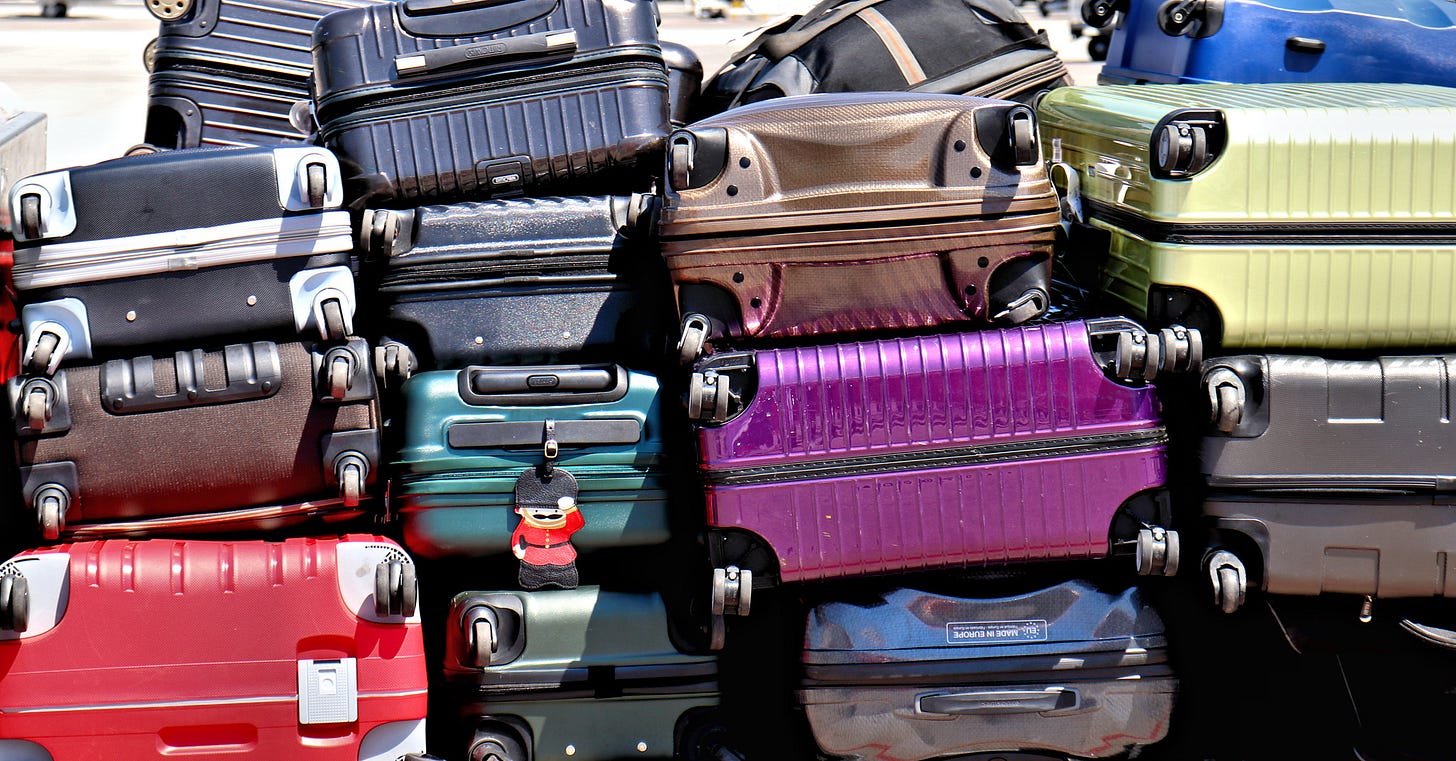Holiday Travel Is Plagued By Corporate Power
Consolidation comes home with you for the holidays.

This is Boondoggle, the newsletter about how corporations rip off our states, cities, and communities, and what we can do about it. If you’re not currently a subscriber, please click the green button below to sign up for free. Thanks!
Editor’s note: This is the last edition of Boondoggle for the year, so I just want to say thanks to all of you for subscribing, commenting, sending tips, and generally being a wonderful audience. I’ll be back in January with my annual state legislative session preview. Happy holidays!
Some 100 million Americans will travel for the holidays over the next week, taking planes, trains, and automobiles all over the country. In doing so, they will be interacting with several sectors of the economy that are extremely consolidated, depending on just a handful of corporations to ensure they make it to where they’re going on time, and in relatively good spirits.
This isn’t unique to travel, of course. Overall, in the last 30 years, 75 percent of U.S. industries have grown more consolidated, with that marked drop in choice leading to worse customer service and labor conditions, as well as higher prices. But this week, in particular, the potential for consolidated power to ruin the holidays is pretty high with so many people moving around.
Here’s a quick rundown of why:
Airlines: Since the 1970s, dozens of airlines have consolidated down to just a handful. Delta, for example, is the result 16 different mergers. American is the result of 12, United is 7 and Southwest is 5. Making matters worse, the four biggest airlines are all partially owned by the same common, dominant institutional investors. That consolidation has led to new lows in customer service, increasingly opaque pricing, and worse labor conditions, none of which has prevented the industry from needing to be bailed out by the public repeatedly, even as large parts of the country see reduced service or lose service altogether.
Rental cars: Currently, just three corporations — Enterprise, Hertz, and Avis — hold 95 percent of the car rental market. When you see all those counters at the airport, you’re just patronizing different brands from the big three: Enterprise owns Alamo and National, Avis owns Budget, Payless and Zipcar, and Hertz owns Thrifty and Dollar, for example. The car rental corporations have turned that economic power into political power, working through state legislatures to dodge taxes and hamstring potential rivals, as well as lard rentals up with hidden fees.
Hotels: Just six corporations account for 80 percent of all branded hotels in the U.S. Wyndham, for example, owns Ramada, La Quinta, Days Inn, Super 8, and Howard Johnson, among many others. Marriott owns Sheraton, Westin, and Residence Inn, among many others. Hilton has various Hilton-branded properties alongside Embassy Suites and Doubletree. Having fewer players in the industry makes it easier for the big hotel chains to collude on fees, scale back on points and loyalty programs, engage in price-fixing schemes, take advantage of franchisees, and ultimately raise prices. Airbnb has also been rolling up the short-term rental lodging market, with detrimental effects not just on travelers, but on local housing markets.
Trains: Passenger rail in the United States is, of course, dominated by the publicly funded Amtrak. But that doesn’t mean corporate power still isn’t a problem. For example, I wrote recently about how the growth in long cargo trains — fueled by corporate consolidation in the cargo railroad sector — has caused a spike in Amtrak delays, as those trains are too large to use the existing pull-offs that are meant to allow Amtrak passenger trains to pass by.
Booking services: Most of the online travel booking sites you know of are owned by just three large corporations: Expedia Group, TripAdvisor, and Booking Holdings. Expedia Group, for example, owns Expedia, Orbitz, Hotwire, Travelocity, and Trivago, as well as the short-term lodging site Vrbo. Booking Holdings owns Booking.com, as well as Priceline, Kayak, and the restaurant booking site Open Table. This consolidation allows these corporations to engage in a host of anti-competitive tactics that ultimately raise prices for consumers, as well as run some tax scams on the side.
Fortunately, some of this consolidation has been slowed recently, with the Department of Justice blocking a proposed merger between Spirit Airlines and Jet Blue, and an attempt by Choice Hotels to take over Wyndham falling apart. But far more has to be done to reduce the corporate power buried in the various ways in which we get around.
Happy trails, I guess?
SIMPLY STATED: Here are links to a few things that caught my eye this week.
New York has a new law cracking down on companies that use bots to corner the market on restaurant reservations.
“Nevada is using a secret algorithm to determine which students are considered at-risk enough to warrant additional education funding, raising concerns about transparency.”
Apple’s safety protections for kids in the App Store aren’t working.
Some Maryland counties are using rent control to beat back Wall Street consolidation of their housing markets.
Arkansas legislators approved a new rule requiring pharmacy benefit managers (PBMs) to reimburse pharmacies for dispensing drugs.
School districts are getting scammed by sellers of bulletproof windows that are not actually bulletproof.
Thanks for reading this edition of Boondoggle. If you liked it, please take a moment to click the little heart under the headline or below. And forward it to friends, family, or neighbors using the green buttons. Every click and share really helps.
If you don’t subscribe already and you’d like to sign up, just click below.
Thanks again!
— Pat Garofalo



Pat, what are your thoughts on opening up the US air market to foreign airlines? I feel like it's one area where the best 10+ companies are all non-American...